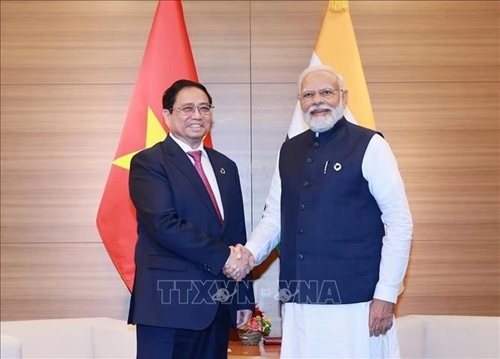Talking to the media ahead of the trip, made at the invitation of Indian PM Narendra Modi, Arya said bilateral relations date back long before the diplomatic ties were officially established in 1972. The time between 1947 and 1972 was a highly important period, when President Ho Chi Minh and Indian leaders built up close-knit connections, laying a solid cornerstone for the countries’ relations. Aside from the solidarity and support for each other, India sent representatives to Hanoi during the 1950-1972 period, setting a basis for deep understanding between the countries’ leaders.
    |
 |
|
PM Pham Minh Chinh (left) and his Indian counterpart Narendra Modi meets at the expanded G7 Summit in Hiroshima, Japan, on May 20, 2023. |
The diplomat noted over the last 52 years, Vietnam and India have gradually and steadily upgraded bilateral relations to new levels, now the comprehensive strategic partnership. Political understanding, cooperation, and mutual support at international forums like the United Nations and other multilateral mechanisms could be seen clearly during this process.
Their trade revenue has surged from less than 200 million USD to 15 billion USD at present, reflecting how economic partnerships have changed. Encouraging results have also been recorded in people-to-people and cultural exchanges, yoga and Buddhist links, or defense - security cooperation.
With such firm stepping stones, PM Chinh’s visit will be another demonstration of the unceasing development of bilateral ties, the ambassador went on.
The trip takes place eight years after PM Modi visited Vietnam in 2016. Since then, the two sides have organized many delegation exchanges at all levels to have in-depth discussions on a wide range of areas. Therefore, this visit is a critically important occasion for the two countries to look back on their achievements obtained in all aspects, including politics, trade, economy, people-to-people exchanges, security, and defense, especially since the comprehensive strategic partnership was set up in 2016, he said.
About the path ahead, Arya held that amid the current complicated world context, to Vietnam and India, economic growth, national development, and prosperity are an important priority that should be promoted by boosting trade, investment, and business links. They should look into complex changes at present and work out ways to secure fruitful cooperation and support each other on the basis of the traditional solidarity.
Another priority is technology – an extremely important field, including emerging technologies such as telecommunications, digital technology, energy transition, and military technologies.
The diplomat said the two sides will discuss all areas of the comprehensive strategic partnership and explore new cooperation spheres.
He perceived that India and Vietnam share similarities in their approaches to international issues. Both believe that multilateralism and the reform of multilateralism are greatly significant, providing a basis for them to cooperate effectively, develop the countries, and show their roles and voices in the region and the world.
The issues of developing countries are also common concerns of both India and Vietnam, including sustainable development, energy transition, climate change response, and the settlement of conflicts and political issues through a global view. Given this, the similarity in their stances once again affirms the two countries’ wish to work together more closely towards benefits for both as well as for the region and the world. For example, the Association of Southeast Asian Nations (ASEAN) and the Mekong - Ganga Cooperation framework are useful mechanisms for the countries to further intensify partnerships, Ambassador Arya said.
Source: VNA